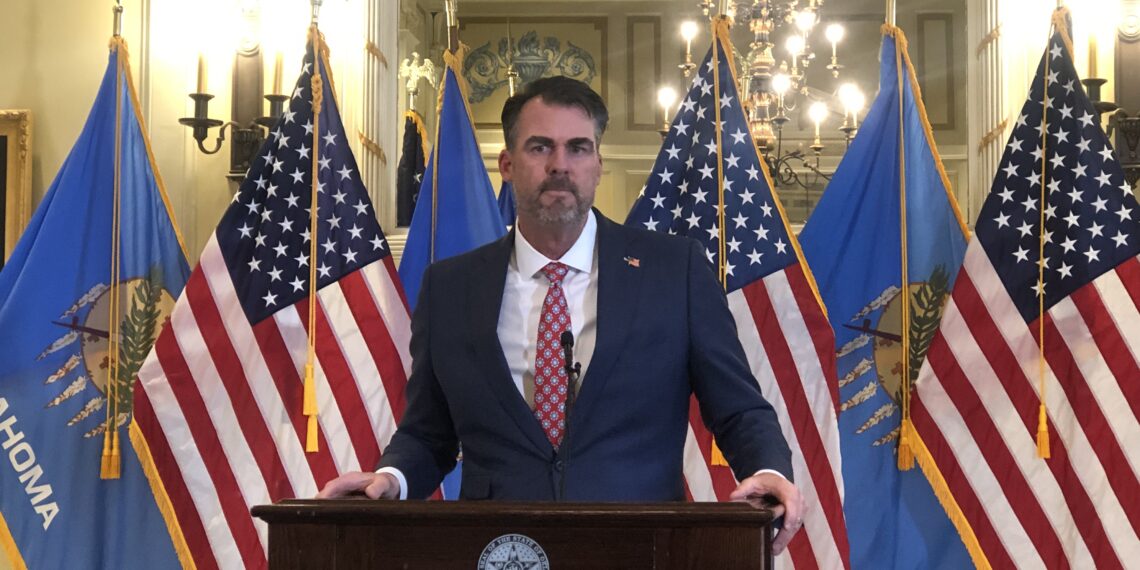OKLAHOMA CITY (OBV) – The Oklahoma Legislature removed Allie Friesen from her position as commissioner of the Oklahoma Department of Mental Health and Substance Abuse Services (ODMHSAS), a move that prompted heated words from Gov. Kevin Stitt, followed by criticism of Stitt’s response.
Both the Oklahoma Senate and Oklahoma House of Representatives approved SCR 12, written by Sen. Paul Rosino, R-Oklahoma City, and Rep. Josh West, R-Grove, to remove Friesen from her ODMHSAS commissioner role. The Senate voted 43-1 for the removal, with only Sen. Shane Jett, R-Shawnee, voting to keep Friesen in the position. The House voted 81-5 for the removal.
Stitt, who appointed Friesen ODMHSAS commissioner in January 2024, blasted the legislative firing of Friesen. He directly criticized the resolution’s authors, Rosino and West, and suggested that Rosino’s wife was in part responsible for the financial issues that plagued the Mental Health Department and led to Friesen being fired. This statement from Stitt appeared across Oklahoma media:
“From the start, this was nothing more than a politically motivated witch hunt. I tasked Allie Friesen with bringing accountability and transparency to the agency. She disturbed the status quo and questioned long-held practices at the agency. An agency rife with sweetheart deals and criminal elements was disrupted, and now, elected officials are quickly working to set the apple cart right for those who seek to get rich off of Oklahoma taxpayers. Josh West and Paul Rosino need to first answer what they stand to gain from Allie Friesen being removed. What are they trying to keep covered up? What conflicts of interest are they trying to hide? Is Senator Rosino trying to help his wife avoid responsibility for her role in the finance department there? Oklahomans deserve answers.”
Gov. Kevin Stitt
Senate President Pro Tempore Lonnie Paxton sharply criticized Stitt for his statement, taking special exception with the governor’s remarks regarding Rosino’s wife.
“Governor Stitt has crossed a line. His recent attempt to smear the good name of Senator Rosino’s wife, is not just petty—it’s disgraceful. Senator Rosino’s wife is a part-time administrative employee. Instead of attacking a public servant’s spouse, the governor should be addressing the real problem – his own failed appointee.
This isn’t an isolated failure—it’s part of a pattern. The executive branch continues to produce multimillion-dollar disasters that are routinely dumped in the Legislature’s lap to clean up. The legislature entrusted this governor with more control of this agency, and he has wrecked it in record time.
After months of serious discussions, even with the governor, I asked Senator Rosino to file this resolution, as he is the Senate Chairman of Health and Human Services, also because the department deserves real leadership—not an unqualified appointee who is in over her head. For Governor Stitt to retaliate by targeting a Senator’s spouse is beneath the dignity of his office.”
Pro Tem Lonnie Paxton
The Department of Mental Health’s finances have been under intense scrutiny. A wide range of investigations probed the department’s financial practices.

An Oklahoma House of Representatives select committee was created to review finances at the Department of Mental Health.
Stitt appointed attorney Robert McCampbell as special counsel to conduct a full, independent investigation into the department.
The Legislative Office of Fiscal Transparency (LOFT) reviewed existing contracts and finances to provide a third party perspective on how the Department of Mental Health has handled state-appropriated money.
A recent audit requested by Stitt and conducted by State Auditor and Inspector Cindy Byrd found “glaring financial and systemic issues” within ODMHSAS.
The select committee reviewed the following issues:
- Reports of using current fiscal year funds to cover prior year expenses
- The cancellation of Certified Community Behavioral Health Clinic (CCBHC) contracts and its impact on service continuity
- The agency’s request for FY25 supplemental funding
- The unexplained allocation of $5 million for an electronic medical records (EMR) system that was never implemented
- Long-term budget planning for FY26
- Updates related to the federal court-ordered consent decree impacting ODMHSAS
“With just over a month remaining in the legislative session, this investigation is a top priority,” House Speaker Kyle Hilbert, R-Bristow, previously said. “Our goal is to understand the department’s financial practices, ensure accountability and determine whether additional funding is truly necessary before the session concludes.”
Friesen testified before the committee during the first day of hearings. She said the Department of Mental Health has a $43-million deficit. She said that amount was reduced from an originally discovered $63-million shortfall.
“Likely, within the last year and a half, I have shared a similar concern and questions,” Friesen said regarding concerns over the Department of Mental Health’s finances. “I am hopeful we all will leave today with clear alignment as to the current situation of the Department of Mental Health and Substance Abuse Services, how we got here and where our vision is moving forward.”
The deficit was discovered in February. Friesen said she was alerted to some potential concerns over ODMHSAS’s Title 19 funding, and was told the department was potentially short of the amount of funds needed for Fiscal Year 2025.
Friesen was asked by committee members if she could identify the source of the deficiency.
“The initial concern was that the true amount that the department required was not originally requested. At a high level, it seems as if, historically, the required Title 19 funds that the Department of Mental Health needed in order to pay the Healthcare Authority for our portion of the costs was not adequately requested,” she said.
Friesen said during the hearing that her goal is for the Department of Mental Health to be a reliable, accountable and transparent organization.
“Unfortunately, that is not what this administration inherited,” she said. “We realize that the communications and the coverage and the rumors that are flying around are not positive. And we have been very open with that. We want to shine a light on the things that have been seen before. And that is not to have some kind of witch hunt, that’s not to get anybody in trouble. That is to fix the system so that we can be accountable, and that this legislative body feels comfortable and confident in appropriating dollars [to the Department of Mental Health and Substance Abuse Services], knowing that they are going to where they are supposed to go.”
She described the situation at the Department of Mental Health as “chaotic.”
“Frankly, we are moving towards a much more stable, confident place as an organization,” she said.
Friesen said during the hearing that she’s not a politician and has failed to “understand how all these pieces fit together.”
“I own that and am trying to learn from smarter people around me as to how to better navigate through that,” she said. “My priority has been and will always be ensuring access to high-quality care. We have made mistakes and we have tried to quickly own those mistakes as quickly as humanly possible.”
Oklahoma Attorney General Gentner Drummond, who previously criticized Stitt for not firing Friesen, commended the legislature for removing her from the position.
“I commend the Legislature for coming together to do what is in the best interests of vulnerable Oklahomans who depend on critical services provided by the Department of Mental Health,” Drummond said. “Gov. Stitt had every opportunity to do the right thing, but inexplicably he chose to protect a failed bureaucrat instead of making the changes necessary to best serve Oklahoma families. The Legislature showed tremendous resolve in spite of the Governor’s petty personal attacks and threats. That is true leadership, and I applaud them.”
Stitt began pursuing an investigation following “disturbing discoveries” related to the previous ODMHSAS leadership’s finances and contracting practices.
“I’ve had frustrations with the mental health department for years and now that we have Commissioner Allie Friesen putting a fresh set of eyes on the department, it’s clear there are problems that need special attention,” Stitt previously said. “What we need is an independent third party who can focus all their energy on shining light on this agency and rooting out bad actors.”
Stitt’s investigation looked into the Department of Mental Health’s finances, employment records and contracting practices to see if any laws were broken, according to officials from the governor’s office.
Stitt previously said Friesen found points of concern after she fired the Department of Mental Health’s chief financial officer as well as other lieutenants within the agency.
“Sometimes, when you have people at agencies who have been there for 30-40 years, they’re moving the ball pretty good, they understand how this building works and they’re paying every invoice so nobody squawks,” Stitt said.
An initial financial examination report of an audit being conducted on ODMHSAS was recently sent to Stitt.
CPA David Greenwell prepared the report, which aims to give a transparent look at the Department of Mental Health’s financial operations. A $43-million deficit was previously discovered at ODMHSAS.
Greenwell worked with ODMHSAS and the Oklahoma Office of Management and Enterprise Services (OMES) to examine financial practices, evaluate short term funding needs, and give recommendations for future procedures.
The report shows that ODMHSAS has a projected $29.9 million supplemental funding need for FY2025. It also makes 52 recommendations to strengthen internal controls, financial accountability and service delivery at ODMHSAS.
“This report is the signal for a new beginning for the department,” Stitt said. “I’m grateful to David Greenwell for his quick work and to Commissioner Friesen and her team for their cooperation.”
Prior to the legislature firing Friesen, Stitt said changes were being made at ODMHSAS that would prioritize ethical standards, modern accounting systems, and improved reimbursement protocols.
“No one signs up for a job like this thinking they’ll have to take on decades of financial mismanagement. Commissioner Friesen has navigated this challenge admirably and has kept me and my team informed every step of the way,” Stitt said. “Oklahomans will be better off now that we have a handle on this department.”
Greenwell’s report made the following recommendations:
- Hiring a Chief Financial Officer and internal auditor with deep public sector experience
- Adopting OMES-approved accounting systems for better interoperability
- Using advanced analytics to prevent fraud and improve decision-making
- Expanding training to promote a culture of ethical conduct and accountability
- Enhancing transparency through real-time dashboards and public reporting
“I’ve worked with many entities facing similar challenges,” Greenwell said. “Nothing about this department is permanently broken. With intentional adjustments to procedures, ODMHSAS will be able to get back to the business of caring for the most vulnerable Oklahomans.”
Stitt previously outlined the following three actions to stabilize ODMHSAS operations:
- A nationally respected, independent financial expert will be brought in to take temporary control of the department’s finances. This expert will assess the agency’s financial shortfall and produce an accurate and credible supplemental budget request for the Legislature.
- As previously announced, the Governor will name a well-regarded attorney with experience in complex investigations to conduct a full and independent review of ODMHSAS. The investigator will report directly to the Governor’s Office and will have full authority to follow the facts wherever they lead.
- The Governor has directed Oklahoma Healthcare Authority CEO Ellen Buettner, along with ODMHSAS officials, to conduct a top-to-bottom review of all Medicaid and federally funded functions within the agency. This effort will evaluate whether these responsibilities should be administered by a different agency or in a different manner to ensure greater accountability and efficiency.

















